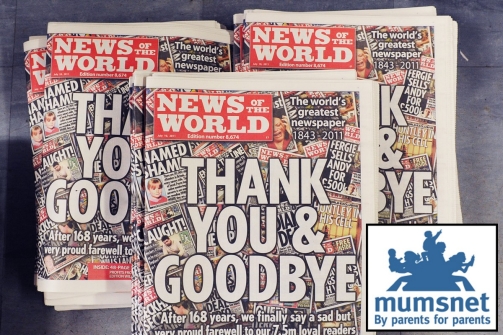
How Angry Moms Toppled the 'World'
Bill Coles
It used to be that if a newspaper in Britain ran a scandalous front page, there was only one course of action to those who objected: bleat to the Press Complaints Commission—mostly to no avail.
How times have changed.
Charging the bulwark of News of the World recently was an army of angry mums.
True, it was Rupert Murdoch who shuttered the 168-year-old paper this weekend—a decision some described as a canny business move—after a series of damaging exposés, mostly by the newspaper The Guardian. But it was a group of articulate and dynamic mothers, members of the influential British site Mumsnet.com, who seized on the public outrage following revelations that people affiliated with News of the World had hacked into the phone of a murdered schoolgirl named Milly Dowler.
What an astonishing turnaround. Twenty years ago, it was newspapers calling the tune—closing down companies and drumming politicians out of office. Now papers are unable to style themselves “the voice of the people” because if “the people” want to get heard, they go online—in the case of the phone-hacking scandal, hitting News of the World where it hurt: on the bottom line.

News of the World closes amid scandal after 168 years, Tony Kyriacou / Rex Features / AP Photo
Doubtless the Press Complaints Commission might, eventually, have weighed in. But with laserlike accuracy, Mumsnet went for the advertisers in a campaign to shame them away from News of the World. And the great slumbering beast of public indignation—dormant during the years when the phone-hacking scandal was confined to the world of celebrities—was finally aroused.
Justine Roberts, cofounder of Mumsnet, told The Daily Beast: “The hacking story had been rumbling along for a while and people hadn’t really engaged with it. On the whole it hadn’t really caught people’s interests, particularly because it was seen to be one media group against another.
“But the Milly Dowler episode put it into huge contrast. People were sickened. On Mumsnet, we have a number of parents who had suffered the loss of a child, and their stories put it all into stark relief. That lit the touch-paper.
“There were already campaigns going on Twitter and Facebook—a lot of other outlets. We just wanted to make the point that we found the hacking of Milly Dowler’s phone really offensive and disgusting.
“But there was never any coordinated effort on our part. It was all down to individual users who came up with suggestions. Some of them were saying they were going to cancel their Sky subscriptions; others suggested we should go for the advertisers.
“But Mumsnet is believed to be so influential, and now it’s almost become self-fulfilling.”
Mumsnet currently has 1.6 million unique visitors a month.
Mumsnet published a list of News of the World’s advertising clients, complete with email addresses, and encouraged people to voice their complaints directly. There were also links to prepared messages, which asked the companies to reconsider advertising with News of the World. One such message read: “Dear @The-Cooperative, will you be reconsidering your advertising spend with #notw given that we now know they hacked Milly Dowler’s phone?”
“The bringing down of Murdoch’s paper had a lot in common with the Arab Spring.
”
Within hours the campaign went viral, with Mumsnet tweets being retweeted by the thousands, sending the #notw hashtag to the top of the U.K.’s trending topics. Advertisers, who after all make their living gauging the zeitgeist, were not slow in responding. The Ford Motor Company was among the first to pull its advertising, but other blue-chip companies soon followed, including the Lloyds Banking Group, Virgin Holidays, Coca-Cola, Vauxhall, and Renault, with some companies publishing unusually strongly worded statements of revulsion over what seemed to have been a regular practice at the paper. (Coca-Cola, for example, was “shocked.”)
The bringing down of Murdoch’s paper, it seems, had a lot in common with the Arab Spring.
“The power of Mumsnet—and all big social-media groups—is that they allow people to collect and organize easily,” Roberts said. “People who care about something can easily start a thread on Mumsnet, [and] do it from the comfort of their own homes, on their laptop. They don’t have to attend rallies, they don’t have to go anywhere.”
The Royal British Legion also weighed in, dropping News of the World as a campaigning partner after it was revealed the paper had hacked the phones of war widows. In just one day, the News of the World brand had become irredeemably toxic.
When the paper’s editor, Colin Myler, announced its closure, he told listeners: “The Guardian were out to get us—and they got us.”
And, yes, The Guardian deserves credit for relentlessly reporting on the story. But the angry mothers were pretty formidable, too.
July 10, 2011
